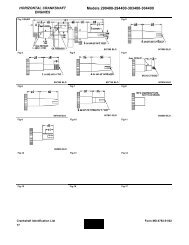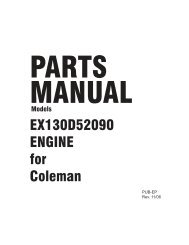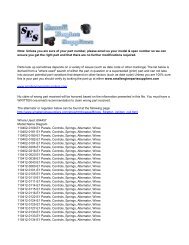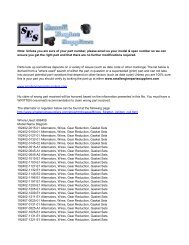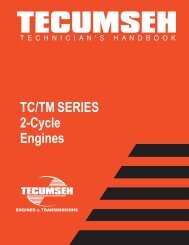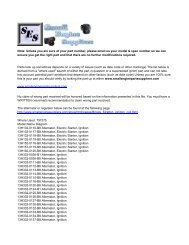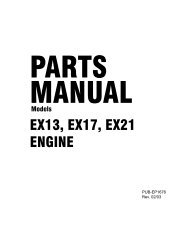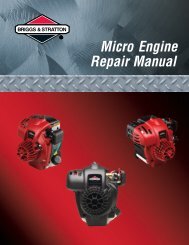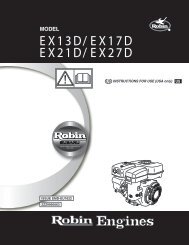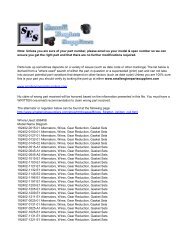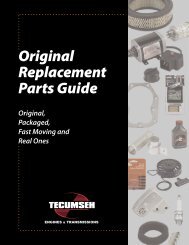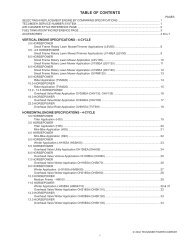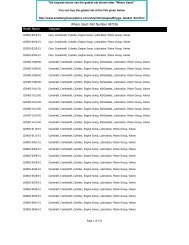Quick Facts Mini Version 695933 - Small Engine Suppliers
Quick Facts Mini Version 695933 - Small Engine Suppliers
Quick Facts Mini Version 695933 - Small Engine Suppliers
- No tags were found...
You also want an ePaper? Increase the reach of your titles
YUMPU automatically turns print PDFs into web optimized ePapers that Google loves.
General Safety PrecautionsA. Avoid Carbon Monoxide PoisoningAll engine exhaust containscarbon monoxide, a deadly gas.Breathing carbon monoxide cancause headaches, dizziness,drowsiness, nausea, confusionand eventually death.Carbon monoxide is a colorless, odorless, tasteless gaswhich may be present even if you do not see or smell anyengine exhaust. Deadly levels of carbon monoxide cancollect rapidly and you can quickly be overcome andunable to save yourself. Also, deadly levels of carbonmonoxide can linger for hours or days in enclosed orpoorly-ventilated areas. If you experience any symptomsof carbon monoxide poisoning, leave the areaimmediately, get fresh air, and SEEK MEDICALTREATMENT.To prevent serious injury or death from carbon monoxide:• NEVER run engine indoors. Even if you try toventilate engine exhaust with fans or openwindows and doors, carbon monoxide can rapidlyreach dangerous levels.• NEVER run engine in poorly-ventilated or partiallyenclosed areas such as barns, garages,basements, carports, under dwellings, or in pits.• NEVER run engine outdoors where engineexhaust can be drawn into a building throughopenings such as windows and doors.B. Avoid Gasoline FiresGasoline (fuel) vapors are highly flammableand can explode. Fuel vapors can spreadand be ignited by a spark or flame manyfeet away from engine. To prevent injury ordeath from fuel fires, follow theseinstructions:• NEVER store engine with fuel in fueltank inside a building with potential sources ofignition such as hot water and space heaters,clothes dryers, electric motors, etc.• NEVER remove fuel cap or add fuel when engineis running.• NEVER start or operate the engine with fuel fill capremoved.• Allow engine to cool before refueling.• NEVER fill fuel tank indoors. Fill fuel tank outdoorsin a well-ventilated area.• DO NOT smoke while refueling tank.• Use only an approved red GASOLINE containerto store and dispense fuel. Tecumsehrecommends purchasing gasoline in containerswith a capacity of 2.5 gallons or less. <strong>Small</strong>containers are easier to handle and help eliminatespillage during refueling.• DO NOT pour fuel from engine or siphon fuel bymouth.C. Adult Supervision of Operation,Refueling and MaintenanceNot everyone who is allowed to use an engine is capableof safely and responsibly operating, maintaining and/orfueling it. Tecumseh recommends the following:• An adult should fuel the engine. NEVER allowchildren to refuel an engine.• An adult should perform maintenance on an engine.Only allow children to perform maintenance if anadult has determined they are experienced andcapable of such operation.• An adult should start the engine. Only allow childrento start the engine if an adult has determined theyare experienced and capable of such operation.To avoid unsupervised operation of the engine,especially by children, NEVER leave it unattendedwhen it is running.D. Stay Away from Rotating PartsNEVER operate an engine with an unguarded engineshaft.The equipment manufacturer mayattach a sprocket and chain or pulleyand belt to the engine shaft. If theseparts are not properly guarded, or if youare not sure whether they are properlyguarded, DO NOT use your engine;contact the equipment manufacturer.Hands, feet, hair, jewelry, clothing, etc.can become entangled in rotating parts,leading to serious injury or death. Toavoid serious injury or death, be surethe flywheel guard is in place.iii



